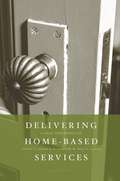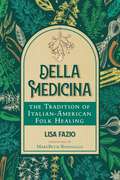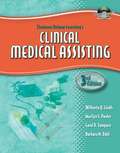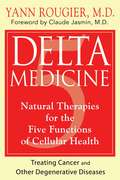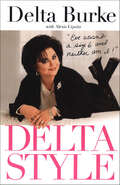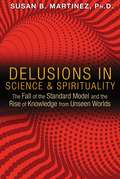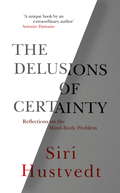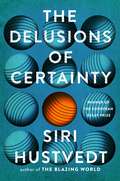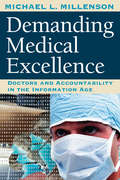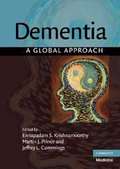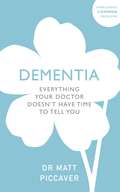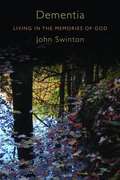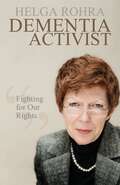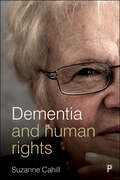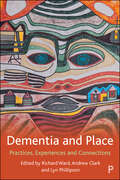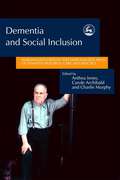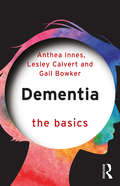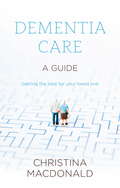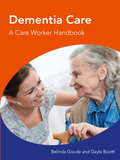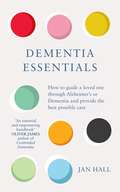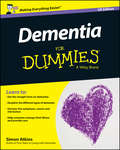- Table View
- List View
Delivering Health Care in America: A Systems Approach, Sixth Edition
by Leiyu Shi Douglas A. SinghDelivering Health Care in America, Sixth Edition is the most current and comprehensive overview of the basic structures and operations of the U.S. health system--from its historical origins and resources, to its individual services, cost, and quality.
Delivering Home-Based Services: A Social Work Perspective
by Elizabeth M. Tracy Susan F. AllenService providers are increasingly called upon to serve clients at home, a setting even a seasoned professional can find difficult to negotiate. From monitoring the health of older populations to managing paroled offenders, preventing child abuse, and reunifying families, home-based services require models that ensure positive outcomes and address the ethical dilemmas that might arise in such sensitive contexts. The contributors to this volume are national experts in diverse fields of social work practice, policy, and research. Treating the home as an ecological setting that guides human development and family interaction, they present rationales for and overviews of evidence-based models across an array of populations and fields of practice. Part 1 provides historical background and contemporary applications for home-based services, highlighting ethical, administrative, and supervision issues and summarizing the social policies that shape service delivery. Part 2 addresses home-based practice in such fields as child and adult mental health, school social work, and hospice care, detailing the particular population being treated, the policy and agency context, theories and empirical data, and practice guidelines. Part 3, the editors present a unifying framework and suggest future directions for home-based social work.
Deliziose ricette vegane per stare bene e mantenersi in forma
by Andy HawkinsAlcune persone potrebbero essere preoccupate per la mancanza di nutrienti in una dieta vegetariana. Tuttavia scoprirai che alcuni tipi di frutta e verdura possono fornire gli elementi necessari per darti una dieta perfettamente bilanciata. Alcuni dei nutrienti che destano preoccupazione sono proteine, ferro, calcio e vitamina b12. Le proteine possono essere facilmente trovate nei fagioli e nei prodotti a base di fagioli come il tofu. Anche noci e piselli sono buone fonti di proteine. Il ferro può anche essere trovato in tofu, fagioli, spinaci, bietole e anacardi. Il calcio si trova facilmente nel latte di soia, nei broccoli, nel cavolo riccio, nella senape e nel cavolo. Quando inizi con questo stile di vita, potresti voler fare piccoli passi. Inizia con un pasto vegetariano al giorno. Ciò consente di adattarsi gradualmente ai diversi gusti e sapori di una dieta vegetariana. Una volta che sei abituato a consumare un pasto vegetariano ogni giorno, puoi aggiungere lentamente un altro pasto vegetariano fino a quando non hai completamente cambiato il tuo stile di vita. La ricerca ha scoperto che alla fine fare piccoli cambiamenti è più sostenibile. Non è una gara. Prenditi il tuo tempo e goditi i diversi tipi di pasti vegetariani.
Della Medicina: The Tradition of Italian-American Folk Healing
by Lisa Fazio• Details the healing techniques and folk wisdom the author learned from her Italian grandparents and from healers in Southern Italy, including plant preparation methods, medicines, rituals, recipes, kitchen magic, and protective magic• Provides a materia medica of plants important in this tradition, sharing each plant&’s history, mythology, and both practical and magical uses• Reveals how working with traditional plant medicines can help us connect to and revitalize our own ancestral traditions for deep inner healingBuilding upon the in-depth folk wisdom she learned from her immigrant grandparents as well as from local healers in Southern Italy, second-generation Italian-American and experienced herbalist Lisa Fazio shares herbal traditions and practices from the Italian diaspora and reveals how working with traditional plant medicines can help us connect to ancestral traditions for deep inner healing.She explains how the herbal healing practices of her Italian ancestors were simply a part of everyday life, what they called Benedicaria, which literally means &“the Blessing Way&” but is more often translated as &“the things we do.&” Examining how plants are not only food and medicine but a vital yet invisible part of traditional communities, she details the techniques of Benedicaria, folk Catholicism, and the animistic traditions of her ancestors, including plant dialects, preparation methods, rituals, and recipes, as well as provides a materia medica. Discussing the relationship between Italian folk medicine and Italian witchcraft, she explores kitchen magic and protective magic, including practices for warding off the adverse effects of the evil eye.Sharing valuable and nearly forgotten teachings from the Southern Italian herbal tradition, the author also shows how her journey to reconnect with her family&’s healing practices offers guidance for anyone seeking to reconnect with their ancestors.
Delmar's Clinical Medical Assisting (3rd Edition)
by Wilburta Q. Lindh Carol D. Tamparo Marilyn S. Pooler Barbara M. DahlDelmar's Clinical Medical Assisting, Third Edition is part of a dynamic learning system that includes a textbook, workbook, interactive CD-ROM, and instructor support materials. The new edition maps to the latest CAAHEP Standards and Guidelines for Medical Assisting Educational programs and the ABHES Program Requirements and Curriculum. Delmar is a part of Cengage Learning. This edition provides great opportunities for critical thinking through case studies, scenarios, and features tying to both of Delmar's Medical Assisting DVD series. New features include Spotlight on Certification for CMA, RMA, and CMAS, reflective of the 2005 CMA certification exam outline; HIPAA boxes; ABHES and CAAHEP Featured Competencies; and Critical Thinking question boxes.
Delta Medicine: Natural Therapies for the Five Functions of Cellular Health
by Claude Jasmin Yann RougierA simple five-part program to awaken your self-healing potential at the cellular level • Gives your body the support it needs to control and reverse chronic and degenerative diseases such as cancer or multiple sclerosis • Provides anti-stress and anti-fatigue breathing practices, color-coded food guides, detoxification plans for specific organs, relaxation techniques, and creative psychological exercises to remove any blocks to your will to heal • Explains how these methods are completely compatible and safe to use with modern medical therapies, such as chemotherapy and radiation Developed by French doctor Yann Rougier to reinforce health at the cellular level, where disease first manifests, Delta Medicine provides a simple, step-by-step method to awaken your self-healing potential and give your body the support it needs to control and reverse chronic and degenerative diseases such as cancer or multiple sclerosis. The Delta Medicine program addresses the five basic functions of a cell--breathing, nutrition, elimination of wastes, communication with other cells, and the creation and expression of emotions--with five corresponding practical tools: anti-stress and anti-fatigue breathing practices, color-coded food guides to develop the “reflexes” of healthy nutrition, targeted detoxification plans for specific organs, easy relaxation techniques to make peace with your illness and find calm during medical treatments, and creative psychological exercises to remove the unconscious blockages that often imprison your will to heal. An effective and perfectly safe complement to standard medical treatments, including chemotherapy and radiation, Delta Medicine’s gentle transformations offer a way to actively participate in your own healing.
Delta Style
by Delta Burke Alexis LipsitzMeet Delta Burke - beloved star of Designing Women, accomplished actress, founding partner of Delta Burke Design, a sassy, glamorous actress for whom learning to live as a "real-size" woman has presented all kinds of opportunities. A beauty-pageant winner, Delta had a much publicized weight gain during Designing Women and was the subject of press speculation and gossip. But as she started to come to terms with the fact that her body would always be full figured, she found her fans loved her all the more, and the outpouring of support began to compensate for the emotional strain. With wit, honesty, and directness, she discusses the pain she felt, her agonizing efforts to achieve a size 6 body, and her own journey to self-acceptance, which led her to found Delta Burke Design, a clothing company for the real-size woman.Filled with inspirational motivational advice, humorous anecdotes, and style tips from this nationally adored celebrity, Delta Style shows how positive thinking can transform your state of mind and give you the confidence to live up to your own - ond only your own - expectations.Beautiful Delta is a perfect role model for the millions of women who find coping with a real-size body requires strategy and acceptance, as will as for those coptivated by her screen presence and smart, upbeat approach to life.
Delusions in Science and Spirituality: The Fall of the Standard Model and the Rise of Knowledge from Unseen Worlds
by Susan B. MartinezDebunks cherished theories of mainstream consensus and reveals the deeper mysteries of the science of the unseen • Reveals a new “Theory of Everything” to replace the standard model and complete our knowledge of Earth Science, anthropology, psychology, and spirituality • Explains the failings of the Big Bang, evolution, ice age theory, and global warming • Shows how the Freudian and Jungian theories of the unconscious have grossly misrepresented the spirit of man and the psyche of humanity What if science and society’s most darling theories, taught as fact, were 100% wrong? What if the anomalies that disprove these theories were covered up and distorted and any serious challenges brushed off as lunacy, hysteria, junk science, and dissension? In this primer in deprogramming, Susan B. Martinez reveals the disinformation at the root of mainstream consensus thinking. She punches gaping holes in the cherished theories of the Big Bang, Darwinian evolution, ice ages, and global warming. Drawing on the ancient science of the unseen and revelations from the Oahspe Bible as well as some of the most advanced thinkers in astrophysics, she explains a new “Theory of Everything” to replace the standard model. She explores the concept of vortexya, the cosmic whirlwind of our own geomagnetic field, which explains quite simply the subtle changes that take place on Earth and in the universe over time without the “magical thinking” of the Big Bang, global warming, or ice ages. Martinez reveals how the instability of society itself has found its way into our theories, positing explosive change and acceleration where there is none. She explains how homo sapiens’ evolution did not suddenly accelerate 40,000 years ago and culture did not accelerate to birth civilization a mere 6,000 years ago. She shows how the theories of the Freudian and Jungian unconscious and of reincarnation have grossly misrepresented the spirit of man and the psyche of humanity. Resurrecting the majestic order that was once recognized at the basis of reality, Martinez shows that the shift from the Age of Disinformation to the Age of Understanding is well underway.
The Delusions of Certainty
by Siri HustvedtPrizewinning novelist, feminist, and scholar Siri Hustvedt turns her brilliant and critical eye toward the metaphysical issues of neuropsychology in this lauded, standalone volume. Originally published in her collection A Woman Looking at Men Looking at Women, The Delusions of Certainty exposes how the age-old, unresolved mind-body problem has shaped - and often distorted and confused - contemporary thought in neuroscience, psychiatry, genetics, artificial intelligence, and evolutionary psychology.
The Delusions of Certainty
by Siri Hustvedt&“The Delusions of Certainty is a unique book by an extraordinary author. Siri Hustvedt is a notable novelist, art scholar, and a philosopher of science. In this memorable and immensely enjoyable volume, Hustvedt rises above the exhausted debate over the two cultures, to demonstrate not just the possibility but also the advantages of combining the approaches of the arts, humanities, and sciences to illuminate a key aspect of the human condition: the mind-body problem.&” —Antonio Damasio, bestselling author of Descartes&’ Error and Self Comes to Mind &“Siri Hustvedt proves her membership in the highest rank of neuroscientists and philosophers who probe the nature of thought and the workings of consciousness. A novelist and a student of psychoanalysis and neuroscience, Hustvedt can ask questions others cannot ask about imagination, identity, epistemology, gendered power, and mortality. Her authoritative knowledge and her courage to challenge the status quo guide the reader to fresh epiphanies about what counts as human nature. The work is, in the end, a work of freedom.&” —Rita Charon, Columbia University &“The Delusions of Certainty is the best book on the mind-body problem I have ever read. Perhaps only a great novelist and essayist can address what neuroscientists and philosophers fail to question. Siri Hustvedt takes the reader on an inspiring journey into highly relevant and often unanswered questions about what it means to be human.&” —Vittorio Gallese, University of Parma Prizewinning novelist, feminist, and scholar Siri Hustvedt turns her brilliant and critical eye toward the metaphysical issues of neuropsychology in this lauded, standalone volume. Originally published in her &“canonical&” (Publishers Weekly) and &“absorbing&” (Kirkus Reviews) collection A Woman Looking at Men Looking at Women, The Delusions of Certainty exposes how the age-old, unresolved mind-body problem has shaped—and often distorted and confused—contemporary thought in neuroscience, psychiatry, genetics, artificial intelligence, and evolutionary psychology.
Demanding Medical Excellence: Doctors and Accountability in the Information Age
by Michael L. MillensonDemanding Medical Excellence is a groundbreaking and accessible work that reveals how the information revolution is changing the way doctors make decisions. Michael Millenson, a three-time Pulitzer Prize nominee as a health-care reporter for the Chicago Tribune, illustrates serious flaws in contemporary medical practice and shows ways to improve care and save tens of thousands of lives. "If you read only one book this year, read Demanding Medical Excellence. It's that good, and the revolution it describes is that important."--Health Affairs "Millenson has done yeoman's work in amassing and understanding that avalanche of data that lies beneath most of the managed-care headlines. . . . What he finds is both important and well-explained: inconsistency, overlap, and inattention to quality measures in medical treatment cost more and are more dangerous than most cost-cutting measures. . . . [This book] elevates the healthcare debate to a new level and deserves a wide readership."--Library Journal "An involving, human narrative explaining how we got to where we are today and what lies ahead."--Mark Taylor, Philadelphia Inquirer "Read this book. It will entertain you, challenge, and strengthen you in your quest for better accountability in health care."--Alex R. Rodriguez, M.D., American Journal of Medical Quality "Finally, a health-care book that doesn't wring its hands over the decline of medicine at the hands of money-grubbing corporations. . . . This is a readable account of what Millenson calls a 'quiet revolution' in health care, and his optimism makes for a refreshing change."--Publishers Weekly "With meticulous detail, historical accuracy, and an uncommon understanding of the clinical field, Millenson documents our struggle to reach accountability."--Saty Satya-Murti, M.D., Journal of the American Medical Association
Dementia: A Global Approach
by Ennapadam S. Krishnamoorthy Martin J. Prince Jeffrey L. Cummings"Growth in the incidence of dementia presents major challenges to global healthcare systems. As the burden of dementia in non-Western cultures grows, developing nations are expected to overtake developed nations in terms of dementia prevalence. Insights from developing nations and transcultural considerations are, nevertheless, neglected in the published literature. Dementia: A Global Approach fills this gap by integrating contemporary cross-cultural knowledge about dementia. Each section reviews the literature from the published, predominantly Western, perspective, contrasting it with empirical knowledge from non-Western cultures. Covering major clinical, epidemiological and scientific areas of interest, detailed consideration is also given to care-giving models across the world and management of patients who have migrated between regions. Enriched with personal insights from clinical experts across the globe, this is a key text for neurologists, geriatricians, psychiatrists, psychologists, epidemiologists and all those responsible for managing provisions of dementia services"--Provided by publisher.
Dementia: Everything Your Doctor Doesn't Have Time to Tell You
by Matt PiccaverYou have suspected for a while that you, or a loved one, might have dementia - and your family doctor has just confirmed this. But they have only ten minutes to tell you everything you need to know about the diagnosis, and it's taken you half that time to take your coat off. This book by a busy working doctor tells you everything you need to know about dementia and its various forms. It will help you to understand what happens to the brain when it develops Alzheimer's Disease (or other forms of dementia) and what the treatment possibilities are. It explains what to expect with symptoms, suggests some non-pharmacological approaches to managing the condition, and covers such practicalities as driving, making your home safe and giving or receiving Power of Attorney where necessary.Covering Alzheimer's Disease, vascular dementia, Dementia with Lewy Bodies and all the other major neurogenerative conditions, this book is packed with information, written with a light, wry humour, and answers all the questions that you didn't know you had until you left the surgery...
Dementia: Everything Your Doctor Doesn't Have Time to Tell You
by Matt PiccaverYou have suspected for a while that you, or a loved one, might have dementia - and your family doctor has just confirmed this. But they have only ten minutes to tell you everything you need to know about the diagnosis, and it's taken you half that time to take your coat off. This book by a busy working doctor tells you everything you need to know about dementia and its various forms. It will help you to understand what happens to the brain when it develops Alzheimer's Disease (or other forms of dementia) and what the treatment possibilities are. It explains what to expect with symptoms, suggests some non-pharmacological approaches to managing the condition, and covers such practicalities as driving, making your home safe and giving or receiving Power of Attorney where necessary.Covering Alzheimer's Disease, vascular dementia, Dementia with Lewy Bodies and all the other major neurogenerative conditions, this book is packed with information, written with a light, wry humour, and answers all the questions that you didn't know you had until you left the surgery...
Dementia: Living in the Memories of God
by John SwintonIn this book John Swinton develops a practical theology of dementia for caregivers, people with dementia, ministers, hospital chaplains, and medical practitioners as he explores two primary questions: Who am I when I've forgotten who I am? What does it mean to love God and be loved by God when I have forgotten who God is? Offering compassionate and carefully considered theological and pastoral responses to dementia and forgetfulness, Swinton's Dementia: Living in the Memories of God redefines dementia in light of the transformative counter story that is the gospel.
Dementia Activist: Fighting for Our Rights
by Prof. Dr. Hans Förstl Dr Elisabeth Stechl Helga Rohra'What's happening to me?' Successful translator and linguist Helga Rohra was understandably good with words - that is, until she found herself getting in a muddle when she spoke. She started to forget the way home, even though she could remember her address. Her confusing symptoms increased and Helga was diagnosed with dementia at age 50 - but she hasn't let herself be labelled with the usual stereotypes. With entertaining vim Helga shows that her life is still as abundant and self-determined as ever, dismantling the negative stereotypes that often surround a dementia diagnosis. She speaks frankly and with humour about her diagnosis and life with young onset Lewy Body Dementia. She explains the changes in her everyday life and the challenges she faces, and shares practical tips that prove it is possible to live well with dementia. Helga also talks about her activism work, which has made hers one of the key voices internationally in dementia advocacy.
Dementia and Human Rights
by Suzanne CahillThe time has come to further challenge biomedical and clinical thinking about dementia, which has for so long underpinned policy and practice. Framing dementia as a disability, this book takes a rights-based approach to expand the debate. Applying a social constructionist lens, it builds on earlier critical perspectives by bringing together concepts including disability, social inclusion, personhood, equality, participation, dignity, empowerment, autonomy and solidarity. Launching the debate into new and exciting territory, the book argues that people living with dementia come within the UN Convention on the Rights of Persons with Disabilities and therefore have full entitlement to all the rights the Convention enshrines. A human rights-based approach has not to date been fully applied to interrogate the lived experience and policy response to dementia. With the fresh analytical tools provided in this book, policy makers and practitioners will will gain new insights into how this broader perspective can be used to further promote the quality of life and quality of care for all those affected by dementia.
Dementia and Place: Practices, Experiences and Connections
by Richard Ward, Andrew Clark and Lyn PhillipsonGiving voice to the lived experiences of people with dementia across the globe, including Australia, Canada, Sweden and the UK, this critical and evidence-based collection engages with the realities of life for people living with dementia at home and within their neighbourhoods. This insightful text addresses the fundamental social aspects of environment, including place attachment, belonging and connectivity. The chapters reveal the potential and expose the challenges for practitioners and researchers as dementia care shifts to a neighbourhood setting. The unique ‘neighbourhood-centred’ perspective provides an innovative guide for policy and practice and calls for a new place-based culture of care and support in the neighbourhood.
Dementia and Social Inclusion: Marginalised groups and marginalised areas of dementia research, care and practice
by Jill Manthorpe Anthea Innes Alison Bowes Carole Archibald Charlie Murphy'There has been a considerable and welcome growth of publications about dementia care and Jessica Kingsley Publishers has certainly played a very useful part in this growth... we need more not less of this quality of work and writing if society is to include those with dementia as full citizens.' - Christian Council on Ageing 'The editors are to be congratulated on assembling a collection of contributions which make this book a milestone in the literature on dementia research and practice... [They] have collected papers on extraordinarily diverse issues and from a very diverse set of authors. Each of the chapters can be seen as an invaluable introduction to the topic area as well as addressing the main theme of the book. It is a milestone book because it manages to provide a snapshot of dementia studies at this moment in time and will, in my view, be widely quoted by policy makers, practice developers, researchers and trainers for the next few years... In such a treasure trove of approaches and issues it is hard to pick out the most striking... I would recommend this book: all readers of the journal will find chapters that they can use to improve dementia care.' - Journal of Dementia Care 'What makes this particularly notable is that Innes, Archibald and Murphy have harnessed such individual voices to address so cogently. Together they address the core issues, all too often neglected or marginalized, in dementia research and care. Sexuality, communication, risk taking, ethnicity, incontinence and practices within remote rural communities are all subjects that draw threads from the very fabric of our society, and it is indicative of how wide the spectrum has broadened that these historically dispirit strands can be tackled constructively.' - Signpost 'A diverse range of subjects are covered in a series of papers written by numerous professionals of standing from various disciplines... The subjects covered include ethnicity, spirituality, sexuality, dying with dementia (palliative care), faecal incontinence and risk-taking. There is a section addressing aspects of communicating with people with dementia and another covering the medical aspects of dementia that have not had much focus in recent years, such as hypertension and diabetes. Finally, there is a social science perspective, including discussing ways that people with dementia can be involved in the research process. I found the book easy to read and it is well written and clearly presented. Covering marginalized areas of practice, it offers food for thought for the reader and is a welcome addition to current literature'. - British Journal of Occupational Therapy 'This book provides invaluable research results and innovative thinking which professionals studying gerontology and dementia care will find very useful throughout their careers.' - London Centre for Dementia Care Newsletter 'The contributors to this volume examine the barriers to the consideration of social inclusion in the field of dementia studies and argue for the necessity of acknowledging the personhood of all individuals with dementia. The papers discuss the sexuality of people with dementia, communication and risk taking, and dementia care in remote rural communities, among other topics. The volume ends with suggestions for more inclusive values, service development, theory and research'. - Book News 'The book, commendably, tries to look at marginalized issues within dementia, such as death and dying, sexuality and faecal incontinence.' - Mental Health Today 'This is a book for the connoisseur. I wish I had contributed a paper. I wish I had read it even earlier. It will be appreciated by many people, from many backgrounds. This is the study of dementia and dementia-care grown to a new maturity. Chapters are original research papers, communicating new findings and analyses, set in the context of previous knowledge, well reviewed... Thanks to the editors and authors for this little gift. Let's be sure it is read widely.' - David Jolley, director of Dementiaplus Examining impo...
Dementia: The Basics (The Basics)
by Anthea Innes Lesley Calvert Gail BowkerDementia: The Basics provides the reader with a clear and compassionate introduction to dementia and an accessible guide to dealing with different parts of the dementia journey, from pre-diagnosis and diagnosis to post-diagnostic support, increasing care needs and end of life care. Co-authored by an academic, a person living with dementia and a family carer, the book endeavours to raise awareness of dementia, challenge stereotypical and negative ideas about what it means to have dementia and champion a society where people living with dementia can be active as they wish for as long as possible. The authors present an overview of current research at each step of the dementia journey as well as including knowledge from lived experience, enhancing understanding and challenging thinking about what it might be like to live with a diagnosis or to care for a loved one. As a whole, the book emphasises the importance of prioritising the person living with dementia, as well as considering the impact of what any initiative or action might mean for them, their families and their care supporters. Offering both an accessible introduction to dementia and practical tools, this book will be ideal for health and social care professionals, students of social care, health care and nursing, people with dementia, carers and anyone wanting to understand more about the condition.
Dementia Care: Sheldon Short Guide
by Christina McDonaldThis book falls into three sections:- Living at home- When care needs increase- Finding and settling your parent into a care homeAll three stages bring different demands and skills. Other topics include:- Safety Planning- When your parent or older friend needs more support- Caring at home- Asking for help- Finding support for yourself
Dementia Care: Sheldon Short Guide
by Christina McDonaldThis book falls into three sections:- Living at home- When care needs increase- Finding and settling your parent into a care homeAll three stages bring different demands and skills. Other topics include:- Safety Planning- When your parent or older friend needs more support- Caring at home- Asking for help- Finding support for yourself
Dementia Care A Care Worker Handbook
by Belinda Goode Gayle BoothWorking with people with dementia? Training in adult or dementia care? You don't have to go it alone!Caring for people with dementia is one of the most challenging and rewarding roles in Health and Social Care. But with a range of awards, certificates and pathways for work-based learners it can be a confusing area for qualifications. That's why we've put together a one-stop handbook to support your training and continuing professional development in demential care.Here in one place is all the topic knowledge, assessment support and practical advice you will need for a range of dementia care qualifications. Core topics are linked to the specific learning and assessment objectives you need to cover for 16 QCF dementia units. Case studies tie learning into the many different settings and roles across Home Care, Residential Care, NHS and Private Settings.This book is especially useful for candidates taking the: Level 2 Award or Certificate in Awareness of Dementia Level 3 Award or Certificate in Awareness of Dementia Level 2 Diploma Health and Social Care Dementia Pathway Level 3 Diploma Health and Social Care Dementia Pathway.It's also a must have reference for those who want to brush up skills and knowledge from previous qualifications.So whatever your level of specialism, give yourself the tools you need to survive and even flourish in dementia care.
Dementia Essentials: How to Guide a Loved One Through Alzheimer's or Dementia and Provide the Best Care
by Jan HallWhen a loved one has been diagnosed with dementia you might step into the new role of carer, helping your relative to remain safe, happy and as independent as possible.In this fully updated and revised edition, Dementia Essentials offers a realistic and reassuring guide to help you and the person affected navigate the complexities of dementia and Alzheimer’s, and face anything that these conditions might place your way. Written by real carers with first-hand experience, this book is now updated with the latest research coupled with essential advice, personal insights and helpful strategies, including:· Advice on medication and getting support from local health professionals · Ideas for encouraging independence, confidence and activity while reducing anxiety, aggression and confusion· Strategies for coping as a carer, helping you understand your emotions and feel more empowered· Guidance on how to prepare for the future, including revised legal and financial advice and tips on choosing a care homePositive and practical, Dementia Essentials will give you with everything you need to provide the best possible care for the person you are supporting.
Dementia For Dummies
by Simon AtkinsYour hands-on guide to dealing with dementiaIf a loved one has recently been diagnosed with dementia, Dementia For Dummies provides trusted, no-nonsense guidance on what this may mean for you and your family. You'll get an understanding of the symptoms of dementia, make sense of the stages of the illness and grasp the differences between the various types of dementia, including Alzheimer's disease and vascular dementia.Dementia is an increasingly common condition that can have a significant impact on family life. Each person diagnosed is unique, and your loved one's symptoms can range from loss of memory to mood changes to communication problems and beyond. This sensitive, authoritative guide walks you through the different scenarios you may encounter as a family member or carer and explains step-by-step how you can keep your loved one as safe and as comfortable as possible--no matter how severe their symptoms are.Gives you the straight facts on dementiaCovers the symptoms, causes and risk factors of dementiaHelps identify and address the fears as you face a diagnosisProvides carers and family members with the information needed to help manage the illnessIf you're looking for support as you adjust to caring for a loved one with dementia, Dementia For Dummies helps make it easier.

